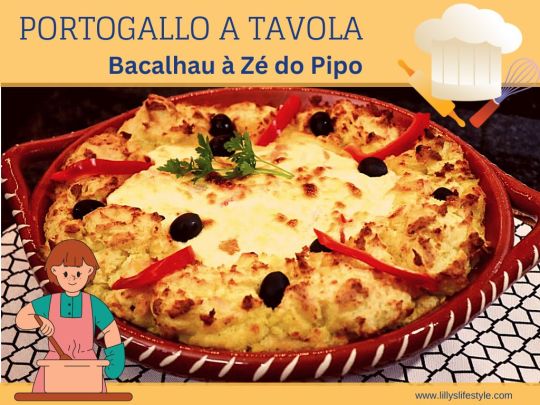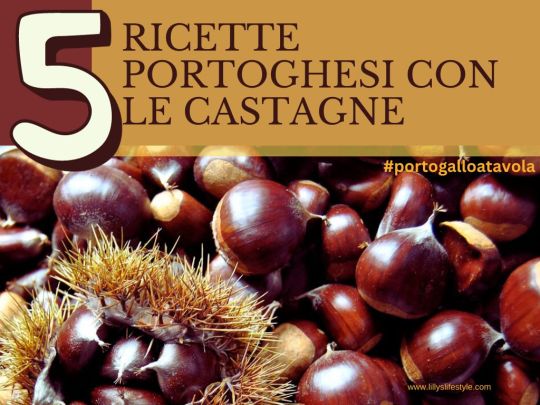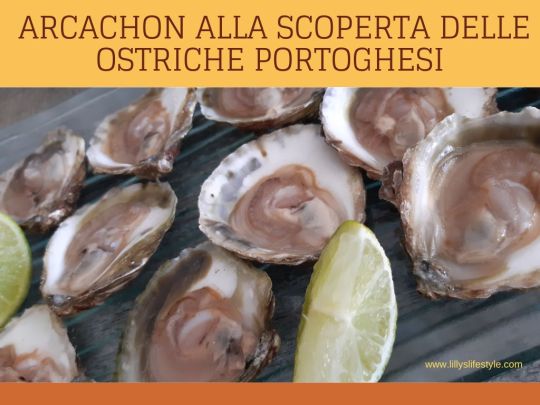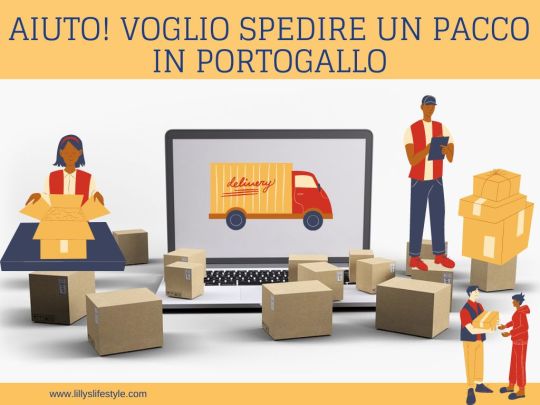#liliana navarra
Text
7 cibi strani da mangiare in Portogallo
Portogallo a tavola: 7 piatti "strani" della gastronomia lusitana
Precisiamo che il termine “strani” che ho utilizzato è da riferirsi a “per noi italiani” o almeno per una parte della popolazione italica. Conclusa la precisazione, direi di passare alla mia personale selezione di pietanze strane, ma non per questo non deliziose, che ho visto sulle tavole portoghesi in questi 20 anni di vita lusofona.
Senza tergiversare troppo sulla gastronomia portoghese,…

View On WordPress
#alla scoperta del portogallo#blogger italiana portogallo#cosa mangiare in portogallo#cosa visitare portogallo#curiosità portogallo#fine settimana in portogallo#gastronomia lusitana#gite fuori porta lisbona#in portogallo con lilly#italiani in portogallo#itinerario portogallo#liliana navarra#lillyslifestyle#piatti curiosi portogallo#piatti pesce portogallo#piatti portoghesi#piatti strani portogallo#pillole di portogallo#portogallo#portogallo a tavola#portogallo imperdibile#portogallo in auto#portogallo insolito#portogallo non turistico#portogallo on the road#portogallo sconosciuto#portugal#scopri il portogallo con lilly#vacanza portogallo#viaggio in portogallo
2 notes
·
View notes
Photo

(via Lisbon day-by-day - Itinerari alternativi [Street art: Village Underground Lisboa & LX Factory] (Day 3))
Cosa troverete: un autobus parcheggiato su vecchi container; un’aquila in business class; terrazze fighette ricavate da magazzini in rianimazione; Adami che vengono tentati da altri Adami; tizi improvvisati che intonano concerti “saudadici”; vicoletti ristretti dai torbidi incontri e riscontri; artisti che partecipano al gran premio “Bagno più cool”; blogger che si fanno intervistare da altre blogger sullo sfondo di (grandi) passioni in comune; asinelli in castigo & more…
Clicca per vedere video & gallery:
https://barbarapicci.com/2017/08/17/lisbon-day-by-day-3-streetart/
#Lisbona#Lisboa#Lisbon#arte#art#street art#graffiti#diari di viaggio#art blogging#travel diaries#travel blogging#Liliana Navarra#Lilly's Lifestyle#urban art#arte urbana#murals#murali#Village underground Lisboa#LX Factory
1 note
·
View note
Text
Villanueva sobre Sunat: "Lo importante es que la nave está con buen timón"
New Post has been published on https://www.ctvsatelital.net/villanueva-sobre-sunat-lo-importante-es-que-la-nave-esta-con-buen-timon/
Villanueva sobre Sunat: "Lo importante es que la nave está con buen timón"
El Premier César Villanueva dijo que se evaluará el desempeño de la titular encargada de la Sunat, Claudia Suárez, antes de tomar una decisión sobre este nombramiento
Villanueva sobre Sunat: “Lo importante es que la nave está con buen timón”
31 de Octubre del 2018 – 20:13 » Textos: María Claudia Medina
Mediante una resolución suprema refrendada por el ministro de Economía y Finanzas, Carlos Oliva, y el Presidente de la República, Martín Vizcarra, el Gobierno aceptó la renuncia de Víctor Shiguiyama, a la jefatura de la Superintendencia Nacional de Aduanas y de Administración Tributaria (Sunat). El ex funcionario fue nombrado en setiembre de 2016, tras conocerse que aportó $ 20 mil a la campaña de Fuerza 2011, mucho antes de su designación.
Al no haber concluido su periodo de cinco años, el Gobierno tiene 60 días calendario para nombrar a su reemplazante y uno de los nombres que había trascendido para el puesto fue el del actual gerente de Estudios Económicos del Banco Central de Reserva (BCR), Jorge Estrella. Sin embargo, el Presidente del Consejo de Ministros (PCM), César Villanueva, le ha puesto paños fríos al rumor.
“No es correcto que hayamos nombrado a este profesional. Lo que hemos hecho es encargar a Sunat a la superintendenta (Claudia Suárez). Se han cruzado informaciones incorrectas con respecto al señor Estrella que no se ajustan a la verdad”, indicó en conferencia de prensa. Precisó que el funcionario del BCR es peruano y nació circunstancialmente en Chile, lo que no afecta su nacionalidad.
Agregó que se han entrevistado a varias personas para liderar el ente recaudador, pero que no tienen prisa en nombrar a alguien. Mientras tanto, la Superintendenta Nacional Adjunta de Tributos Internos, Claudia Liliana Concepción Suárez Gutiérrez, estará como jefa encargada de la entidad. “Ella ya está nombrada, encargada y veremos cómo trabaja en un organismo tan importante. No tenemos apuro en nombrar. Lo importante es que la nave está con buen timón”, indicó.
Claudia Suárez es abogada por la Pontificia Universidad Católica del Perú (PUCP) y posee una Maestría en Tributación de la Universidad de Navarra, España. Además, tiene una Maestría en Finanzas Corporativas de la Universidad del Pacífico. Antes de asumir como Superintendente Adjunta, fue Superintendenta Nacional Adjunta Operativa de Sunat y también es profesora de tributación de la Universidad del Pacífico y de la PUCP.
0 notes
Photo

Transformative Constitutionalism in Latin America
Transformative Constitutionalism in Latin America
Author: Edited by Armin von Bogdandy, Eduardo Ferrer Mac-Gregor, Mariela Morales Antoniazzi, Flavia Piovesan, and Ximena Soley
ISBN: 9780198795919
Binding: Hardcover
Publication Date: 22 August 2017
Price: $125.00
The Emergence of a New Ius Commune
Edited by Armin von Bogdandy, Eduardo Ferrer Mac-Gregor, Mariela Morales Antoniazzi, Flavia Piovesan, and Ximena Soley
A significant contribution to Inter-American jurisprudence and human rights discourse written by leading scholars in the field
Proposes a new framework for conceptualizing the development of Latin American governance
Explores the influence of international precedent on Latin American national government and policy
This ground-breaking collection of essays outlines and explains the unique development of Latin American jurisprudence. It introduces the idea of the Ius Constitutionale Commune en America Latina (ICCAL), an original Latin American path of transformative constitutionalism, to an Anglophone audience for the first time. It charts the key developments that have transformed the region and assesses the success of the constitutional projects that followed a period of authoritarian regimes in Latin America.
Coined by scholars who have been documenting, conceptualizing, and comparing the development of Latin American public law for more than a decade, the term ICCAL encompasses themes that cross national borders and legal fields, taking in constitutional law, administrative law, general public international law, regional integration law, human rights, and investment law.
Not only does this volume map the legal landscape, it also suggests measures to improve society via due legal process and a rights-based, supranational and regionally rooted constitutionalism. The editors contend that with the strengthening of democracy, the rule of law, and human rights, common problems such as the exclusion of wide sectors of the population from having a say in government, as well as corruption, hyper-presidentialism, and the weak normativity of the law can be combatted more effectively in future.
Table of Contents
INTRODUCTION
1. Ius Constitutionale Commune in America Latina: A Regional Approach to Transformative Constitutionalism, Armin von Bogdandy, Eduardo Ferrer Mac-Gregor, Mariela Morales Antoniazzi, Flavia Piovesan, and Ximena Soley
PART I: FRAMEWORK
2. Ius Constitutionale Commune in America Latina: A Conceptual Clarification, Armin von Bogdandy
3. Ius Constitutionale Commune in America Latina: Context, Challenges, and Perspectives, Flavia Piovesan
4. The Struggle for Rights and the Ius Constitutionale Commune, Pedro Salazar Ugarte
5. A Multidimensional Approach to Equality in the Inter-American Context: Redistribution, Recognition, and Participatory Parity, Martin Aldao, Laura Clerico, and Liliana Ronconi
6. Transformative Constitutionalism and the Global South: The View from South Africa, James Fowkes
7. Preserving the Acquis of Transformative Constitutionalism in Times of Constitutional Crisis: Lessons from the Hungarian Case, Pal Sonnevend
PART II: THE DOMESTIC ELEMENT
8. The Mexican Constitution of 1917: An Early Example of Transformative Constitutionalism, Rainer Grote
9. The Amparo as an Instrument of Ius Constitutionale Commune, Allan Brewer Carias
10. The Presidential System in Latin America: A Hallmark and Challenge to a Latin American Ius Constitutionale Commune, Diego Valades
11. The Roberto Gargarella
12. The Block of Constitutionality as the Doctrinal Pivot of a Ius Commune, Manuel Gongora-Mera
13. Inter-Americanization: Its Legal Bases and Political Impact, Mariela Morales Antoniazzi and Pablo Saavedra Alessandri
PART III: THE INTER-AMERICAN ELEMENT
14. The Inter-American System of Human Rights: Essential Features, Sabrina Ragone
15. The American Human Rights Navigation: Toward a Ius Commune, Sergio Garcia Ramirez
16. The Conventionality Control as a Core Mechanism of the Ius Constitutionale Commune, Eduardo Ferrer Mac-Gregor
17. The Transformative Dimension of Inter-American Jurisprudence, Ximena Soley
18. The Impact of Inter-American Judgments by Institutional Empowerment, Oscar Parra Vera
19. The Added Value of the Inter-American Human Rights System: Comparative Thoughts, Laurence Burgorgue-Larsen
Author Information
Armin von Bogdandy, Director of the Max Planck Institute for Comparative Public Law and International Law,Eduardo Ferrer Mac-Gregor, Vice-President of the Inter-American Court of Human Rights,Mariela Morales Antoniazzi, Senior Research Fellow for Latin America at the Max Planck Institute for Public Law and International Law,Flavia Piovesan, Professor of Law, Catholic University of Sao Paulo,Ximena Soley, Research fellow at the Max Planck Institute for Comparative Public Law and International Law, Heidelberg
Armin von Bogdandy is Director of the Max Planck Institute for Comparative Public Law and International Law in Heidelberg and Professor of Public Law at the University of Frankfurt/Main. He has been president of the OECD Nuclear Energy Tribunal as well as a member of the German Science Council and the Scientific Committee of the European Union Agency for Fundamental Rights; he has held visiting positions at the New York University School of Law, the European University Institute, the Xiamen Academy of International Law, and the National Autonomous University of Mexico, among others. Armin von Bogdandy is the recipient of the Leibniz Prize, the prize for outstanding scientific achievements in the field of legal and economic foundations by the Berlin-Brandenburg Academy of Sciences; the Premio Internacional ” (gavel) of the Inter-American Court of Human Rights. His research centres on structural development in public law.
Eduardo Ferrer Mac-Gregor is judge and vice-president of the Inter-American Court of Human Rights, as well as professor at the National Autonomous University of Mexico and researcher at the Legal Research Institute of that university. He studied law at the Autonomous University of Baja California obtained his PhD in law from the University of Navarra. He is director of the Iberoamerican Journal of Procedural Constitutional Law (Revista Iberoamericana de Derecho Procesal Constitucional).
Mariela Morales Antoniazzi is a senior research fellow at the Max Planck Institute for Comparative Public Law and International Law in Heidelberg. She studies law at the Andres Bello Catholic University, obtained her LLM at the University of Heidelberg and her PhD at the University of Frankfurt/Main. Mariela Morales Antoniazzi is visiting professor at various Latin American universities and vice-president of the German section of the Iberoamerican Institute of Constitutional Law. She coordinates the project Ius Constitutionale Commune en America Latina (ICCAL) at the Max Planck Institute for Comparative Public Law and International Law.
Flavia Piovesan is professor of constitutional law and human rights at the Catholic University of Sao Paulo, where she holds a position in the human rights postgraduate programmes. She holds additional positions at the Catholic University of Parana, and the human rights and development programme of Pablo de Olavide University, Spain. She was a human rights fellow at the Centre for Brazilian Studies, at the University of Oxford in 2005; and has been a visiting fellow at the Max Planck Institute for Comparative Public Law and International Law on numerous occasions. From 2009-2014 she was there as a Humboldt Foundation Georg Forster Research Fellow. Flavia Piovesan is a former member of the UN High Level Task Force on the implementation of the right to development and a member of the OAS Working Group working on the monitoring of the Protocol of San Salvador on social, economic and cultural rights. In 2016, she was appointed Special Secretary for Human Rights in Brazil.
Contributors:
Martin Aldao
Allan Brewer Carías
Laurence Burgorgue-Larsen
Laura Clérico
James Fowkes
Sergio García Ramírez
Robert Gargarella
Manuel Góngora-Mera
Rainer Grote
Óscar Parra Vera
Sabrina Ragone
Liliana Ronconi
Pablo Saavedra Alessandri
Pedro Salazar Ugarte
Ximena Soley
Pál Sonnevend
Diego Valadés
[via International Law]
https://www.dipublico.org/107205/transformative-constitutionalism-in-latin-america/
0 notes
Text
Portogallo a tavola: Bacalhau à Zé do Pipo

View On WordPress
#alla scoperta del portogallo#Bacalhau à Zé do Pipo#blogger italiana portogallo#cosa visitare portogallo#cucinare ricetta portoghese#curiosità portogallo#fine settimana in portogallo#gite fuori porta lisbona#in portogallo con lilly#italiani in portogallo#itinerario portogallo#liliana navarra#lillyslifestyle#pillole di portogallo#portogallo#portogallo a tavola#portogallo imperdibile#portogallo in auto#portogallo in cucina#portogallo insolito#portogallo non turistico#portogallo on the road#portogallo sconosciuto#portugal#ricetta portoghese bacclà#scopri il portogallo con lilly#vacanza portogallo#viaggio in portogallo#visit portugal#vivere in portogallo
2 notes
·
View notes
Text
4 dolci pasquali del Portogallo
Dopo avervi elencato 24 dolci natalizi passiamo ora a 4 dolci pasquali. Un vero viaggio goloso tra i sapori del Portogallo dal nord al sud del Paese. Cosa ne dite di stupire amici e parenti proponendo a tavola un dolce tipico portoghese?
1- Broinhas de abóbora da Páscoa
Foto: teleculinaria.pt
Le broinha sono un prodotto tipico e unico di Santa Comba Dão associato alla Pasqua, la cui origine si…

View On WordPress
#Bolo de Ançã#broinha pascoa#cosa mangiare pasqua portogallo#cucina portoghese#dolci pasqua portogallo#dolci portogallo#dolci portoghesi#folar pascoa#italiani in portogallo#liliana navarra#lillyslifestyle#pasqua portogallo#Portogallo#portogallo a tavola#portogallo dolci pasquali#Regueifa da Páscoa#ricette dolci portogallo#ricette pasqua portogallo#ricette portoghesi#visit portugal#vivere in portogallo
0 notes
Text
24 dolci natalizi portoghesi
In molti avete apprezzato il calendario dell'avvento 2023 e, in molti, mi avete scritto di conoscere o meno quei dolci. Ho pensato quindi di compilare questa lista, delle 24 proposte che ho pubblicato per il calendario sulle mie reti sociali.
In molti avete apprezzato il calendario dell’avvento 2023 e, in molti, mi avete scritto di conoscere o meno quei dolci. Ho pensato quindi di compilare questa lista, delle 24 proposte che ho pubblicato per il calendario sulle mie reti sociali Facebook e Instagram, per coloro che non hanno avuto la possibilità di scoprire queste dolcezze locali.
QUANTI DOLCI DI NATALE CI SONO IN PORTOGALLO?
La…

View On WordPress
#cosa mangiare a natale in portogallo#cosa mangiare in portogallo#cucina portoghese#curiosita portogallo#dolci natalizi portogallo#dolci portoghesi natale#gastrnomia portogallo#gastronomia portoghese#italiana in portogallo#italiani in portogallo#liliana navarra#lillyslifestyle#panettone portoghese#portogallo#portogallo a tavola#portogallo in cucina#ricette portogallo#ricette portoghesi#vivere in portogallo
1 note
·
View note
Text
Portogallo a tavola: 5 ricette per celebrare S. Martino
5 ricette di castagne per celebrare san martino
San Martino senza castagne… non è San Martino! Almeno in Portogallo. Vi ho già raccontanto nel blog che, in Portogallo, è tradizione fare un grande “magusto“, bere “agua-pé” e “jeropiga”. E, ovviamente, provare il vino nuovo.
no dia de São Martinho, vai à adega e prova o vinho”
Sapevate che, secondo alcuni storici, il magusto risalirebbe a un’antica tradizione di celebrazione del giorno di…

View On WordPress
#castagne portogallo#italiani in portogallo#liliana navarra#lillyslifestyle#magusto#Portogallo#portogallo a tavola#portogallo in cucina#ricette castagne#ricette portogallo castagne#ricette portoghesi#ricette portoghesi castagne#san martino portogallo#vivere in portogallo
0 notes
Text
Cena romantica a Lisbona? Ecco la mia lista segreta
Lisbona è sempre romanitca, lo so. Molto spesso però mi contattate per chiedermi un consiglio su un ristorante romantico dove cenare a Lisbona. Potevo mai deludervi?

View On WordPress
#100maneiras lisboa#alisbonaconlilly#belcanto lisbona#cena romantica lisbona#chef stellati lisbona#dove cenare a lisbona#dove mangiare a lisbona#esperienza gastronomica lisbona#feitorialisbona#FIFTY SECONDS MARTÍN BERASATEGUI#guida italiana lisbona#italiana a lisbona#italiani a lisbona#liliana navarra#lillyslifestyle#lisbona cose imperdibili#lisbona portogallo#menu degustazione lisbona#pestana lisbona#ristoranti con vista lisbona#ristoranti lisbona#ristoranti romantici lisbona#ristoranti stella michelin lisbona#tágide lisbona#valle flôr lisbona#valverde sítio lisbona#vivere a lisbona
0 notes
Text
Viaggio ad Arcachon per scoprire la storia delle ostriche portoghesi
Viaggio ad Arcachon per scoprire la storia delle ostriche portoghesi

View On WordPress
#arcachon francia#Bassin d&039;Arcachon#bordeaux dintorni#bordeaux e dintorni#cosa visitare arcachon#cosa visitare francia#cosa visitare in francia#cosa visitare sud francia#cosa visitare vicino bordeaux#dolce tipico arcachon#duna di sabbia più alta d&039;europa#Dune Blanche arcachon#Dune du Pilat#francia#golfo arcachon#in viaggio con lilly#La prima è la visita della città di Arcachon e la seconda sono due porticcioli delle ostriche: Port de La Teste-de-Buch e la Maison de l&03#Landes de Gascogne#liliana navarra#lillyslifestyle#origine ostriche francia#ostriche#ostriche arcachon#ostriche francesi#ostriche francia#ostriche portogallo#ostriche portoghesi#ostriche portoghesi origine in francia#Port de La Teste-de-Buch#Port de La Teste-de-Buch la Maison de l&039;Huitre
0 notes
Text
Il risotto alla portoghese, 5 piatti che amerete
Portogallo a tavola, rubrica di gasronomia portoghese in italiano: il riso alla portoghese.
Cominciamo col dire che quelli che noi traduciamo per risotti, in portoghese “arroz de…”, non è simile al risotto italiano ma molto brodoso. I portoghesi non hanno la pretesa di cucinare risotti, infatti non li chiamano così ma solo “riso di…”.
Detto questo, vorrei proporvi 5 piatti a base di riso che sono sicura amerete. Si spazierà tra mari e monti e tra regioni diverse. Siete pronti a…

View On WordPress
#alla scoperta del portogallo#arroz de pato ricetta#arroz doces ricetta#arroz polvo ricetta#blogger italiana portogallo#cosa visitare portogallo#curiosità portogallo#dolce portoghese con riso#fine settimana in portogallo#gite fuori porta lisbona#in portogallo con lilly#italiani in portogallo#itinerario portogallo#liliana navarra#lillyslifestyle#piatti di riso portogallo#piatti strani cibo portogallo#pillole di portogallo#portogallo#portogallo a tavola#portogallo imperdibile#portogallo in auto#portogallo insolito#portogallo non turistico#portogallo on the road#portogallo sconosciuto#portugal#ricetta riso al pomodoro portogallo#ricette portogallo#ricette portoghesi
1 note
·
View note
Text
Portogallo a tavola: 5 piatti di pesce (ricette)
Portogallo a tavola: 5 piatti di pesce senza baccalà
Ancora una volta mi sento in dovere di sfatare il mito che in Portogallo si mangia solo baccalà. Ho già consigliato numerosi piatti di carne e pesce che non contemplano il “fedele amico” (non è il cane non temete ma il nomignolo che i portoghesi hanno affibiato al baccalà).
Cosa propongo? Cinque piatti di mare dove il baccalà non ha diritto di entrata. Pronti a prender nota e a cimentarvi in…

View On WordPress
#alla scoperta del portogallo#ARROZ DE LAMPREIA#blogger italiana portogallo#Carapaus de Escabeche#cosa mangiare in portogallo#cosa visitare portogallo#curiosità portogallo#fine settimana in portogallo#gite fuori porta lisbona#in portogallo con lilly#italiani in portogallo#itinerario portogallo#liliana navarra#lillyslifestyle#piatti pesce portogallo#pillole di portogallo#polipo portogallo#Polvo no forno ao Alhinho#portogallo#portogallo a tavola#portogallo imperdibile#portogallo in auto#portogallo insolito#portogallo non turistico#portogallo on the road#portogallo sconosciuto#portogallo senza baccalà#portugal#ricette pesce portogallo#ricette portoghesi
1 note
·
View note
Text
Portalegre: tra vini, tappezzeria e storia
Si torna in Alentejo: Potalegre tra vinim tappezzeria e storia

View On WordPress
#alentejo portogallo#alla scoperta del portogallo#blogger italiana portogallo#cosa visitare portalegre portogallo#cosa visitare portogallo#curiosità portogallo#dove mangiare portalegre portogallo#fine settimana in portogallo#gite fuori porta lisbona#in portogallo con lilly#italiani in portogallo#itinerario portogallo#liliana navarra#lillyslifestyle#musei protalegre#museo Guy Fino portalegre#pillole di portogallo#portalegre alentejo portogallo#portalegre città 7 conventi#portogallo#portogallo imperdibile#portogallo in auto#Portogallo in un bicchiere#portogallo insolito#portogallo non turistico#portogallo on the road#portogallo sconosciuto#portugal#prova vini tapada do chaves alentejo#scopri il portogallo con lilly
0 notes
Text
5 prodotti gastronomici portoghesi meno conosciuti (1. carne di maiale)
"Portogallo a tavola" la rubrica che vi farà scorpire i piatti meno conosciuti del Portogallo.
Nelle ultime settimana, nella mia pagina Facebook, sto condividendo alcune curiosità su dei prodotti gastronomici portoghesi poco conosciuti ma che vale la pena conoscere durante un viaggio tra i sapori di questo Paese.
Per questo primo appuntamento di #portogalloatavola, consiglio cinque prelibatezze tipiche a base di carne di maiale. Per le ricette portoghesi invece vi invito a seguire la mia…

View On WordPress
#ALHEIRA TRANSMONTANA#alla scoperta del portogallo#blogger italiana portogallo#BUTELO DE VINHAIS#CABEÇA DE XARA#CHICCORRO#cosa mangiare in portogallo#cosa si mangia in portogallo#cosa visitare portogallo#curiosità portogallo#fine settimana in portogallo#gastronomia portogallo#gite fuori porta lisbona#in portogallo con lilly#italiani in portogallo#itinerario portogallo#liliana navarra#lillyslifestyle#piatti carne portogallo#pillole di portogallo#portogallo#portogallo imperdibile#portogallo in auto#portogallo in cucina#portogallo insolito#portogallo non turistico#portogallo on the road#portogallo sconosciuto#portugal#ROJÕES à MINHOTA
0 notes
Text
S.O.S. Espatriati: il pacco di prodotti italiani
Unboxing: la scatola dei prodotti per gli italiani espatriati
Oggi voglio dedicare questo articolo a tutti e tutte le espatriate come me. Saranno le feste in arrivo, saranno gli (oramai) 20 anni di vita all’estero ma quel momento di “Ambrogio vorrei qualcosa di….” italiano, mi assale.
Non ditemi che voi non avete mai sentito quel bisogno di sapori legati a dei ricordi, magari l’infanzia, l’adolescenza o forse solo un evento della vostra vita passata in…

View On WordPress
#a lisbona con lilly#alisbonaconlilly#blogger italiana lisbona#concerti lisbona#cosa fare fine settimana lisbona#due giorni a lisbona#e-commerce prodotti italiani#eventi gratis lisbona#eventi lisbona#fine settimana lisbona#guida turistica italiana lisbona#italiani a lisbona#italiani in portogallo#liliana navarra#lillyslifestyle#lisbona#lisbona curiosa#lisbona non turistica#lisbona portogallo#lisbona prodotti italiani a domicilio#locali notturni lisbona#mangiare italiano portogallo#Pillole di Lisbona#portogallo#prodotti italiani in portogallo#prodotti italiani in portogallo dove acquistarli#tour italiano lisbona#unboxing scatola di prodotti italiani all&039;estero#vacanza lisbona#vico food box
0 notes
Text
Aiuto! Voglio spedire un pacco in Portogallo
Consiglio utile per chi volesse spedire un pacco per e dal Portogallo
Quante volte ho letto questa frase nei vostri messaggi o email che mi avete inviato. Io stessa mi son trovata più di una volta in questa situazione. In questi 20 anni in Portogallo, le cose sono migliorate (per fortuna) e non è più necessario accendere un cero in chiesa in cerca del miracolo. Non ci credete? Ora vi spiego tutto.
Come fare allora?
Da espatriata come voi non immaginate la…

View On WordPress
#a lisbona con lilly#alisbonaconlilly#blogger italiana lisbona#come spedire pacci italia portogallo#concerti lisbona#cosa fare fine settimana lisbona#due giorni a lisbona#eventi gratis lisbona#eventi lisbona#fine settimana lisbona#guida turistica italiana lisbona#italiani a lisbona#italiani in portogallo#liliana navarra#lillyslifestyle#lisbona#lisbona curiosa#lisbona non turistica#lisbona portogallo#locali notturni lisbona#mercatini e fiere#mostre e eventi a lisbona#Pillole di Lisbona#portogallo#spedire adesso#spedire pacchi portogallo#spedire pacco italia portogallo spedizioniere#spedizioni correriere italia portogallo#tour italiano lisbona#trasloco portogallo
0 notes